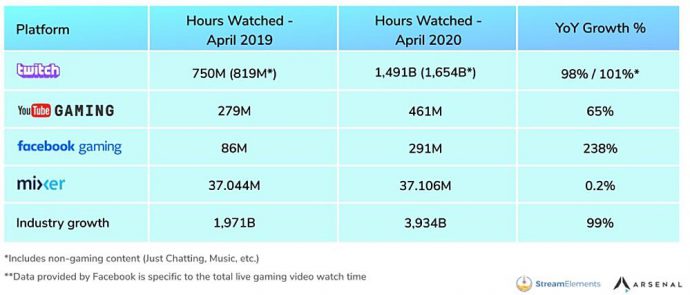#228: Cash App Hits 40 Million Users and Aims to Launch a Consumer Lending Product, & More
- 1. Cash App Hits 40 Million Users and Aims to Launch a Consumer Lending Product
- 2. Will Technology Increase Productivity in the Education Industry?
- 3. Waymo Teams Up with Volvo For Autonomous Ride-Hailing, But Success Could Take Years
- 4. Decentralized Diagnostic Testing Could Benefit Community Hospitals
- 5. ARM Is Powering the World’s Top Supercomputer, and Future Macs
- 6. Microsoft Is Shutting Down Mixer
1. Cash App Hits 40 Million Users and Aims to Launch a Consumer Lending Product
According to SensorTower, an analytics firm focused on mobile applications, Cash App recently surpassed 40 million monthly active users (MAUs). After increasing roughly 60% from 15 million in December 2018 to 24 million in December 2019, the number of Cash App MAUs has exploded during the COVID-19 crisis. Important to note, SensorTower defines MAUs as users who have opened the Cash App at least once per month, while Square’s definition includes users who transact at least once per month. In other words, SensorTower’s estimate could include users who downloaded the Cash App but decided not to use it, potentially inflating the MAU number.
In other Cash App news, the Digital Wallet seems likely to launch a consumer lending product in the next few months. According to job postings, Cash App will launch a product offering “customers a way to access additional funds when they need it”. The emphasis on instant availability – “when they need it” – is not a surprise, as Cash App already has optimized for instant access to funds across its existing product line. In our view, Cash App will leverage the proprietary data it collects across Cash App’s product suite to underwrite consumer loans, much like Square Capital leverages proprietary merchant data to underwrite small business loans.
In the future, Cash App is likely to offer a complete range of consumer finance products, upending banks with a superior user experience and more cost-effective products and services.
2. Will Technology Increase Productivity in the Education Industry?

Labor productivity in the education industry has declined during the past few decades. In our view, online education platforms could reverse this trend.
Instead of one teacher reaching 20 students at a time, superstar teachers – or practitioners in the field – could reach millions of students with each course. Companies like 2U and Lambda School are experimenting with innovative business models including deferred debt and income sharing agreements, aligning institutional incentives with student success. Instead of pre-paying for all of their education, students pay back debt based on their income.
As the education landscape continues to evolve, ARK would not be surprised to see an “unbundling” of the existing education system. Schools combine education with social, emotional, and athletic development. In the future, services may emerge to address each of these verticals individually.
3. Waymo Teams Up with Volvo For Autonomous Ride-Hailing, But Success Could Take Years

This week, Waymo entered into an exclusive partnership with Volvo for autonomous ride-hailing vehicles. While it has engaged with Fiat Chrysler and Jaguar in the past, the Volvo partnership is the first time that Waymo has partnered with an automaker to build an electric autonomous vehicle from the ground up. Because Waymo has not announced a timeline, the partnership probably will take years to launch, as it will have to recalibrate its autonomous driving system for the Volvo vehicle.
That said, this partnership gives Waymo an opportunity to integrate its technology into an auto manufacturing ecosystem instead of bolting it on to existing vehicles. Further, an all-electric platform is a smart choice for an autonomous ride-hailing service given the lower costs per mile of electric vehicles relative to gas powered cars.
From Volvo’s perspective, a partnership with Waymo seems to be acknowledging the failure of its own autonomous strategy. Volvo has been working on autonomous vehicles for a decade and had hopes of launching an accident-free fleet this year. Waymo is much further along as it already is offering fully driverless taxis to a select group of customers in Arizona. For this reason, a partnership with Waymo is a good bet for Volvo as ARK believes that autonomous taxis will create a winner-takes-most market.
4. Decentralized Diagnostic Testing Could Benefit Community Hospitals
In the US, roughly 85% of cancer patients are in smaller, regional health systems where compliance with precision oncology guidelines is worse than in leading academic centers. According to a recent study, only 29% of patients with advanced colorectal cancer received recommended testing in regional clinics and, even worse, only 3% of them were able to access experimental therapies in clinical trials.
Decentralized molecular diagnostic testing could solve this problem. Typically, hospitals ship tumor biopsies to centralized testing facilities where vendors analyze the samples and report to physicians who then manage patient treatments. In a decentralized model, hospitals receive sample prep reagent kits from vendors, sequence the samples on premise or in nearby core labs, interpret the data with cloud-based analytics, and recommend therapies. Importantly, the community health systems retain custody of the data.
When hospitals custody the sample data, they can collaborate with biopharma partners in clinical trials. Often, biopharma companies will reimburse the community hospitals serving 85% of cancer patients up to $10,000 per patient, helping their financials and sustainability. In our view, Invitae’s (NVTA) STRATAFIDE, awarded an FDA Breakthrough Device Designation in 2019, should streamline review and reimbursement processes if it receives FDA approval.
5. ARM Is Powering the World’s Top Supercomputer, and Future Macs
Following the classic arc of disruption, ARM CPUs continue to move upmarket. This week, Fujitsu unveiled its new Fugaku supercomputer, the world’s fastest supercomputer by a factor of three. Unlike other top ten supercomputers with Intel or IBM processors and Nvidia GPUs, the Fugaku is powered by Fujitsu’s custom ARM CPU, the first time an ARM-based supercomputer has hit the top 10 supercomputer rankings.
In another ARM milestone, Apple announced that it is transitioning the Mac from Intel-based CPUs to custom designed ARM-based CPUs, giving it full control of chip design, from CPU, GPU, to AI accelerators. The first ARM-based Macs will be available by the end of this year. By 2022, Apple will power all of its hardware – from phones and watches to PCs – with custom designed silicon.
Both design wins are consistent with the desire of companies to customize hardware as Moore’s Law slows down. Standards like ARM and RISC-V should continue to gain share as customers move workloads away from x86.
6. Microsoft Is Shutting Down Mixer

On July 22, Microsoft plans to shut down its live streaming platform, Mixer, transferring its assets to Facebook Gaming. We believe Microsoft’s newfound partnership with Facebook Gaming comes after it failed in its strategy of poaching content from Twitch.
Last year, Mixer spent millions of dollars attracting top live streamers like Ninja and Shroud with exclusive deals. With more than 21 million followers on Twitch, Ninja and Shroud could have boosted Mixer’s viewership substantially, but they did not. As shown in the graphic below, as streaming hours nearly doubled in April, hours watched on Mixer barely budged.

Mistakenly, Mixer believed that content is more powerful than distribution. In contrast, Twitch, Facebook Gaming, and YouTube Gaming are thriving because of the distribution and network effects associated with a wide range of content, not just one or two major influencers.


